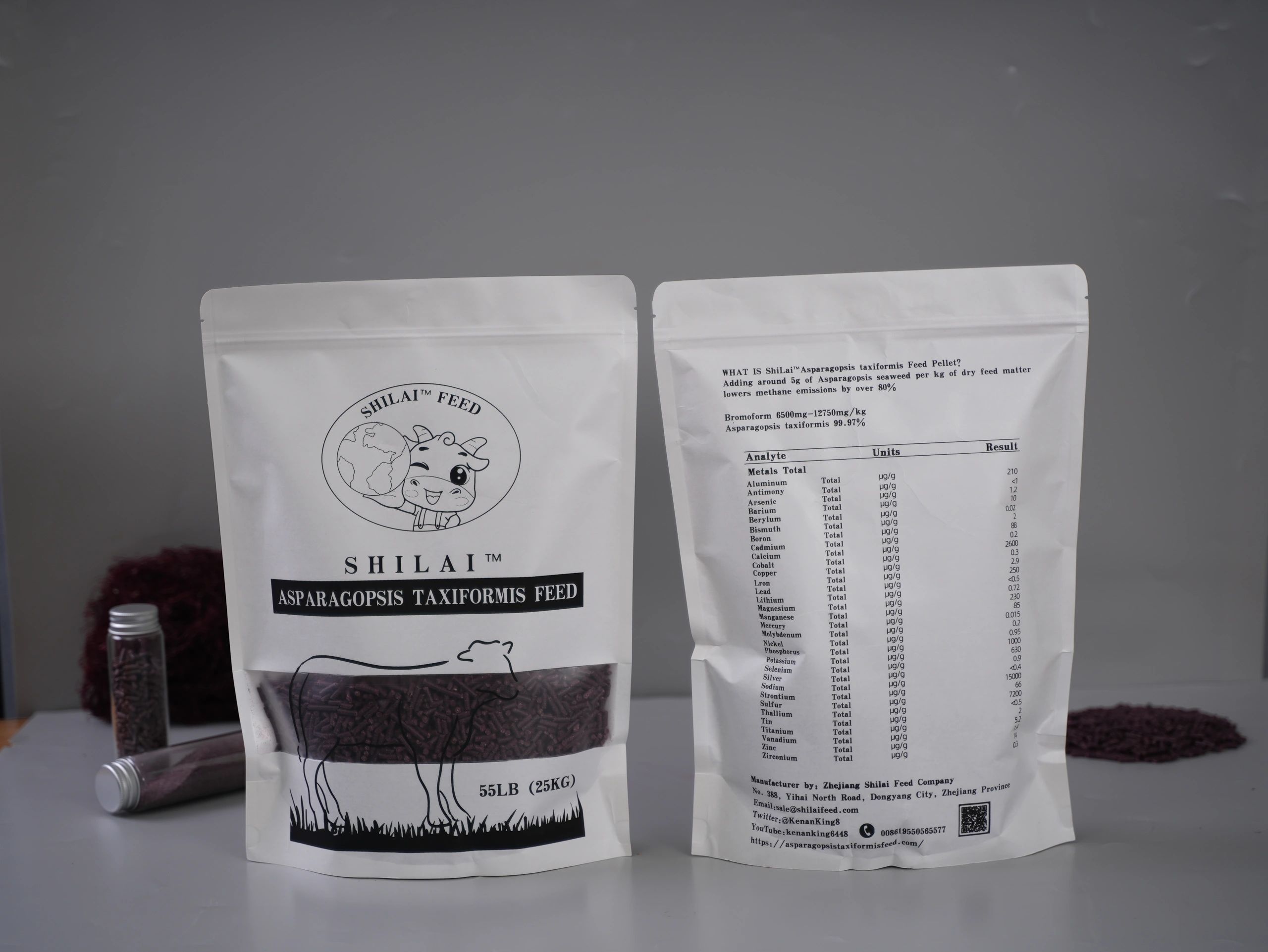Global farming activities are responsible for a large share of greenhouse gas outputs, driven mainly by animal production.
Methane is an especially potent greenhouse gas with a greater climate forcing effect than CO2, raising major concerns.
A red seaweed called Asparagopsis taxiformis has surfaced as a potential game-changing tool to lower methane produced by grazing animals.
This seaweed contains a compound that inhibits methane formation in the rumen, thereby lowering animals’ overall methane output.
Formulating feeds with Asparagopsis taxiformis has produced promising early results that suggest a viable path to reduce farming-related greenhouse gas emissions.
- Additionally, Asparagopsis taxiformis provides further value propositions alongside emissions reductions.
- Enhanced overall livestock health
- Prospects for sustainable blue-economy enterprises and added rural income
Continued study and commercial testing are required, however Asparagopsis taxiformis could be a transformative sustainable solution.
Unlocking the Potential of Asparagopsis taxiformis Powder as a Feed Additive
Powdered Asparagopsis taxiformis offers a convenient avenue to integrate its methane-cutting properties into commercial feeds.
This marine plant contains bioactive and nutritional traits that can enhance livestock performance and productivity.
Formulating with A. taxiformis powder has lowered methane in studies and can provide additional vitamins and minerals to animals.
More targeted research will help define optimal formulations, stability during processing, and sustained impacts on animal welfare.
Asparagopsis taxiformis and the Next Era of Sustainable Animal Production

The crimson alga is attracting interest for its potential to tackle environmental challenges arising from traditional livestock systems.
Adoption of the algae in feed could enable measurable reductions in methane and a smaller ecological footprint for farms.
Studies have reported potential co-benefits for animal welfare and productivity when Asparagopsis is used in feed.
While comprehensive long-term data and commercialization pathways are still being developed, early results are promising.
Mitigating Methane Emissions with Asparagopsis in Animal Diets
Asparagopsis is recognized as a strong candidate for reducing the methane burden from ruminant livestock.
Active substances in the algae modify rumen microbial dynamics, thereby reducing methane production.
- Research trials have demonstrated that Asparagopsis can reduce methane by substantial percentages in controlled studies.
- Incorporating Asparagopsis into rations is an environmentally sound method for methane abatement.
- Farmers and producers are increasingly exploring the adoption of Asparagopsis in feeding programs.
Asparagopsis: The Seaweed Transforming Livestock Production
From ocean science to farm practice, Asparagopsis taxiformis is an emerging contender for sustainable methane mitigation.
- By including Asparagopsis in diets, researchers have reported notable reductions in methane output with clear environmental implications.
- The approach may enable more sustainable food systems that reduce emissions while maintaining farm productivity.
As decarbonization efforts accelerate, Asparagopsis represents a distinctive marine-based pathway to reduce agricultural methane.
Streamlining Asparagopsis taxiformis Feed Applications to Maximize Methane Benefits
Research targets include processing optimization and dosage determination to increase A. taxiformis impact on methane reduction.
The Science Behind Asparagopsis taxiformis's Methane-Lowering Effects
The observed methane reduction results from the seaweed’s compounds that hinder the growth and function of methanogenic microbes.
The compound bromoform within the seaweed is a principal inhibitory agent against methanogenesis, and researchers are studying its dynamics and safety.
Embedding Asparagopsis in Feed Formulations to Drive Sustainable Farming
The species provides a complementary mix of nutrients and bioactives that feed formulators can leverage for sustainability.
The seaweed’s inclusion can enrich feed nutrient profiles, support gut health, and exhibit antimicrobial or immune-supportive properties.
A Greener Food Future with Asparagopsis taxiformis
The species is gaining momentum as a seaweed solution that can materially reduce agricultural greenhouse gas emissions.
- Moreover, the species supplies nutrients that can enhance the dietary profile of feed formulations.
- Researchers and practitioners are investigating diverse applications of the species across farming and food industries.
Integrating Asparagopsis taxiformis into existing practices could produce meaningful reductions in the environmental impacts of agricultural activities.
Enhancing Animal Health and Productivity with Asparagopsis Feed Additives
Asparagopsis is increasingly recognized as a promising feed supplement that may improve both animal health and productivity.
Evidence points to improved digestive nutrient capture and feed efficiency with Asparagopsis, which may raise productivity.
Functional benefits like antioxidant and immune-support properties may accompany Asparagopsis use, reinforcing animal health.
Rising interest in low-emission production pathways makes Asparagopsis a timely option as further research and markets develop.
Building Methane-Cut Feeds with Asparagopsis for a Lower Carbon Future
The farming sector faces mounting pressure to shrink its carbon footprint, and Asparagopsis offers a plausible mitigation pathway.
- Researchers identify the algae’s bioactives as agents that hinder methanogenic activity in the rumen, decreasing methane formation.
- The experimental record includes promising findings of large methane cuts when Asparagopsis is incorporated into feeds.
Adopting this approach may offer a twofold benefit: greener feed and a pathway to transform agricultural emissions performance.